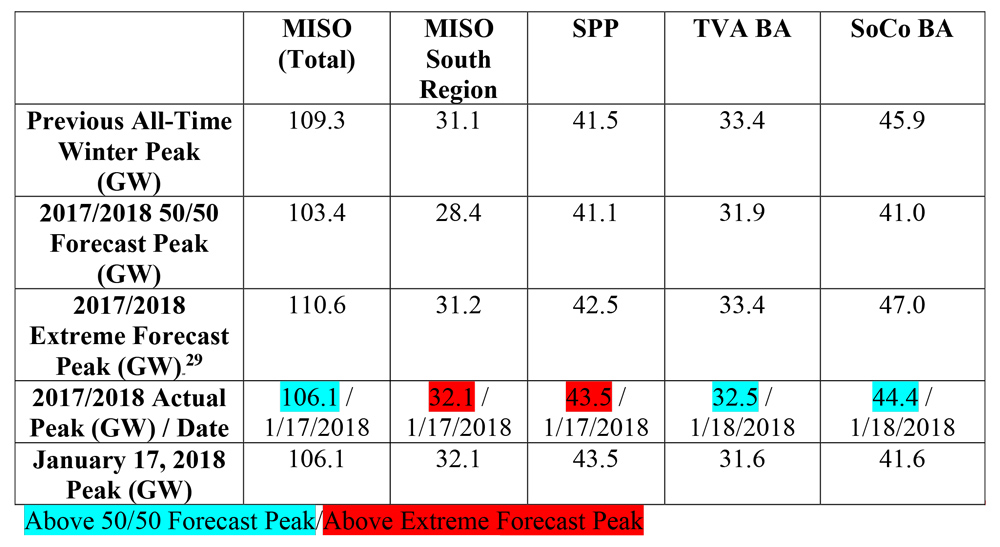The NERC Board of Trustees on Friday unanimously approved standards requiring generator operators (GOs) to protect their units against freezing and share their cold weather operating parameters with regulators.
Project 2019-06 was initiated in response to the FERC/NERC staff report on the January 2018 cold weather event, when below-average temperatures resulted in 183 generating units in SPP, MISO, the Tennessee Valley Authority and SERC Reliability experiencing either an outage or a failure to start over a five-day period.
The board approved three updated standards — EOP-011-2 (Emergency preparedness and operations), IRO-010-4 (Reliability coordinator data specification and collection) and TOP-003-5 (Operational reliability data) — clearing the way for submission for FERC approval.
EOP-11-2, which cleared members’ final ballot with 66% support, adds two new requirements. R7 would require GOs to implement a plan to protect their units from freezing “based on geographical location and plant configuration.” It would also require them to identify operating parameters such as minimum design temperature and fuel switching capabilities. R8 would require GOs to provide maintenance and operating personnel with unit-specific training on the plan.
IRO-010-4, which received support from 71%, and TOP-003-5, which won 72.5% support, would require reliability coordinators, transmission operators (TOPs) and balancing authorities to include in their data specifications provisions for reporting the cold weather information identified by the GO in the cold weather plan.
GOs would be required to satisfy the specification using a mutually agreeable process, as outlined in existing IRO-010 and TOP-003 requirements. (See NERC Cold Weather Standards Headed to Final Ballot.)
Near-term Actions
Because the standards would not take effect for 18 months after FERC approval, Howard Gugel, NERC vice president of engineering and standards, said the ERO will take some short-term measures to ensure reliability in the next two winters.
Gugel said NERC is considering issuing a level 2 alert, which would “be a way of asking generator owners to report back whether or not they have … winter weather preparation plans, and whether or not they have implemented those, and then also whether or not they have attended a webinar that we would be doing.”
He said staff also will address the issues in the winter reliability assessments “to give us a good understanding for both winter and next winter, what we could possibly be exposed to.”
In addition, the FERC/ERO Enterprise report on the 2021 Texas deep freeze is expected by September or October, Gugel said. “We will look at further standard enhancements that are recommended by that inquiry team,” he said.
‘Market’ Question
Gugel told the board there were two “minority issues” raised during the standards development.
Two representatives from the Northern California Power Agency (NCPA) said the standards ran afoul of NERC’s “market principles,” which state that “a reliability standard shall not give any market participant an unfair competitive advantage.”
Marty Hostler, manager of reliability compliance, said requiring “GO/GOP market participants to perform activities that non-registered generator market participants do not have to perform, nor pay for,” violated the principles.
He also said it was unfair that “BAs and regional RC RTOs will be able to use requested information in bid stack analysis for award[ing] day ahead and real-time dispatch. Non-GO/GOPs will not have to submit the same information used in modeling evaluations of their competitive bids.”
He also complained that the drafting team “refuses to make reliability enhancement requirements for BA and RC winterization training, load forecasting improvements, and reserve increases which the FERC/NERC report also discusses.”

“SDT [standards drafting team] responses to the last round of stakeholder comments states a new SAR [standard authorization request] would be required to include these concerns. A couple months ago, during the [Standards Committee] meeting discussing SAR approval, NERC and the SDT chair advertised that the SAR … was written broadly to address stakeholder concerns. Now the SDT … refuses to address these concerns.”
Dennis Sismaet, manager of power management coordinated system operations for NCPA, said, “NERC should not create a reliability standard that applies to all regional entities. Since cold weather is geographic specific, NERC should let the regional entities decide how best to implement any cold weather regional standards specific to their geographic area. For example, in California, there are no cold weather issues that other parts of the country are facing.”
Gugel told the board the drafting team “addressed that appropriately by saying that these were reliability requirements, and that … market issues were not addressed in the standard.”
Some commenters also said the training in R8 of EOP-11 should have been put in the PER standards (Operating personnel credentials) with other training requirements.
Training Requirements
The drafting team noted that there were training requirements sprinkled throughout the standards in addition to the PER standards, Gugel said. “They also felt it was important to keep that training standard adjacent to the plan, so the folks know exactly what that was referring to. There may be a time in the future when we have an idea of consolidating within one standard, but at this point, it seems more appropriate to keep it close to the requirements that the … training requirements are referring to,” Gugel said.
Chairman Ken DeFontes called the new standards “a big first step.”
“Clearly this is going to have a very positive impact on improving our reliability in cold weather events,” he said, adding “I’m confident that once we get the results of the Texas investigation, we’ll have a fulsome conversation about what implications that has for any further work that needs to be done.”
Citing the Texas outages, Trustee Roy Thilly said it was essential that NERC “keep up the momentum on this issue.”
He also said it was important “that the implementation of the standards is as uniform as we can get it — not the temperature criteria — but how it’s audited.”
“This one in particular calls for that,” he said.


